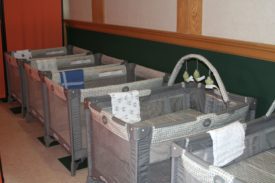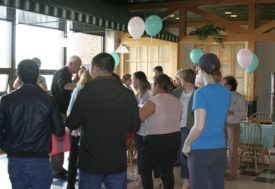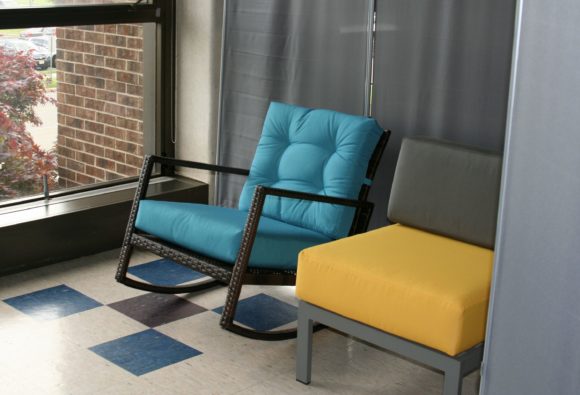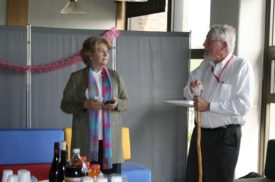On the campaign trail, 2020 presidential candidate Senator Elizabeth Warren relayed a moment that was monumental in the start of her career: the day her toddler became potty-trained. That event was what would qualify her daughter for enrollment in daycare, and enabled Warren to attend Rutgers Law School. That was 1979. Fast-forward to 2019 and working or student moms and dads still have struggles with work-life balance concerning childcare–multiply that several times over for nursing mothers.
Since Warren’s law school days some workplaces have established on-site daycare facilities, but these services can be unaffordable for many young families, and even fewer workplaces provide space for mothers to pump breastmilk.

The FFS sleeping area, in addition to a separate work area, allows for a mother or caregiver to get work done while the baby rests.
A significant advance has recently been made at Rutgers–a Family Friendly Space (FFS) to accommodate mothers having their babies onsite for nursing, has opened at the Rutgers School of Environmental and Biological Sciences on the Cook campus in New Brunswick. The FFS serves as a free facility where lactating mothers can come to work or school, have their babies nearby, and use the space to nurse or pump. Located in the Food Science & Nutritional Sciences building in the space that formerly served as Dudley’s Café, the facility includes a semi-private area for babies to sleep; a private area to nurse or express, a changing station with sink; a social area, and a work area with WiFi. Its function is not to serve as a daycare facility, but rather as a club for families with nursing babies to utilize the space and develop a social network. Lactating mothers will have access to the facility whenever they need it, making their own arrangements for the baby’s care.
Henry Rutgers Professor of Microbiome and Health Maria Gloria Dominguez-Bello, from the departments of Biochemistry and Microbiology and Anthropology, established the FFS with the intent to not only empower young families, but to also serve as a venue for research on babies’ health and development. Research will be conducted looking at differences in babies that are directly breastfed versus those fed bottled breast milk that has been expressed previously. “Nursing is more than just the milk,” said Dominguez-Bello, “It’s about bonding, the mothers and babies will be happier, and babies will be getting the correct milk at the right time with the fluctuations in hormones that are different in the morning than in the evening.” The direct contact may contribute to the development of the baby’s healthy microbiome which can be altered by stress generated from lack of maternal-baby lactation bonding.
Graduate student in nutritional sciences Melissa Woortman is working with Dominguez-Bello on setting-up the facility and the research as part of her doctoral work, assisted by a team of motivated undergraduates, Ciarra Williams and Kat Adams, and alumna Libby Wu. The participants that comply with the study condition criteria will be invited to participate in the research. They will be compared to breast milk bottle-fed babies at FFS or in KinderCare, a drop-off daycare.
Dominguez-Bello notes that all mammals have their babies with their mother during lactation, except urban humans. While society hasn’t facilitated babies being near the mothers during this period, the goal of this effort is to change that paradigm and demonstrate the effects via scientific research. She advocates that the baby’s health and normal development shouldn’t compete with the success of women in science. “Whoever knows me well knows I’m a big defender of having women succeed without contradicting biology” said Dominguez-Bello. To further support the effort from the academic perspective, they will also organize seminars about lactation, babies’ normal growth and other topics during the semester, which will be enabled by a support team of pediatricians, psychologists, biologists and microbiologists.
At the facility’s opening in May, Dean Robert M. Goodman remarked on having Dominguez-Bello’s vision come to fruition, “I often joke that being a dean is a very straightforward and easy thing to do–you sit in your office with your door open and wait for wonderful faculty members to come in and propose a great idea, and all you have to do is say ‘yes’.” Goodman thanked Camille Cennamo and Lisa Estler from the Office of Planning and Budgets for leading the way in identifying the space and making the adjustments that made it possible. “This is a first at Rutgers,” said Goodman “and hopefully there will be more. We have a habit on this campus of starting things that spread and this is just is another one of those initiatives.”

Faculty, students and staff of the School of Environmental and Biological Sciences attended the FFS opening.
Graduate student in nutritional sciences and expectant mother Emily Hanselman, who will be using the FFS, shared her need for such a facility, “I have a two year old and that was difficult my first year here in grad school – finding a place to pump, wanting to breastfeed, wanting to continue my bonding time with my baby. I felt a bit isolated and there were challenges to find someone who understood, and to find a place to pump. I’m just so thankful that there’s this space here.” Regarding the social aspects, Hanselman added, “It can be hard being in grad school or working in different places to find that community. So I’m really excited to meet some of the other moms.”
It isn’t only nursing moms who can appreciate the community. Postdoctoral associate Jincheng Wang, Department of Biochemistry and Microbiology and the father of a baby daughter, shared the strain of the unexpected challenges of caring for a newborn. While Wang’s mother helped his wife, the difficulty of having a baby that was not sleeping generated guilt for not being there to help.
Professor John Worobey, Department of Nutritional Sciences, who studied mothers and infants for many years, summed up the existence of FFS, “Anything that is designed to help promote, encourage and extend the duration of breastfeeding is a darn good thing.”
If you are interested in using and/or finding out more about the space, please contact Melissa Woortman at familyfs2019@gmail.com.



